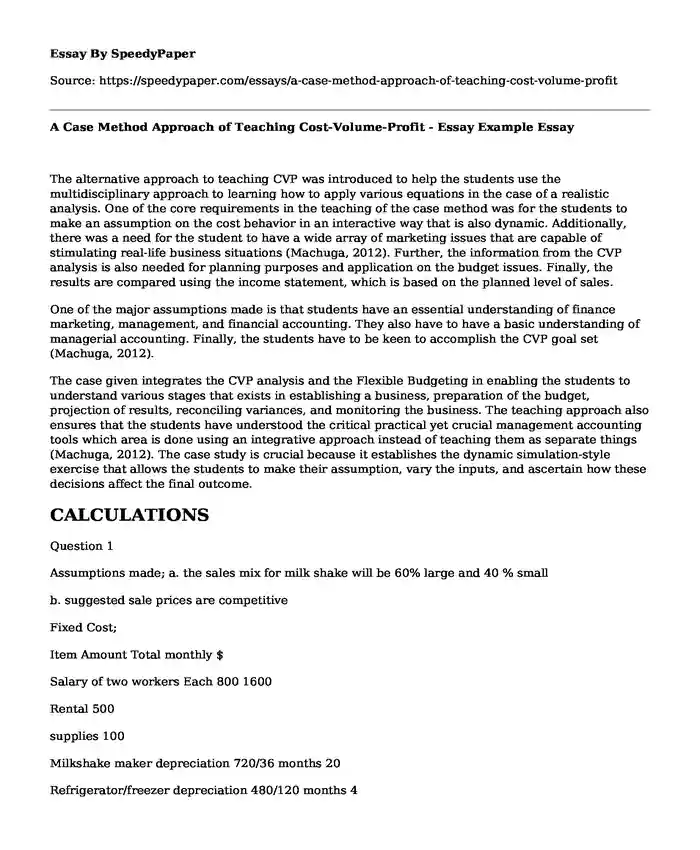
| Essay type: | Quantitative research papers |
| Categories: | Learning Students Money Financial management |
| Pages: | 3 |
| Wordcount: | 557 words |
The alternative approach to teaching CVP was introduced to help the students use the multidisciplinary approach to learning how to apply various equations in the case of a realistic analysis. One of the core requirements in the teaching of the case method was for the students to make an assumption on the cost behavior in an interactive way that is also dynamic. Additionally, there was a need for the student to have a wide array of marketing issues that are capable of stimulating real-life business situations (Machuga, 2012). Further, the information from the CVP analysis is also needed for planning purposes and application on the budget issues. Finally, the results are compared using the income statement, which is based on the planned level of sales.
One of the major assumptions made is that students have an essential understanding of finance marketing, management, and financial accounting. They also have to have a basic understanding of managerial accounting. Finally, the students have to be keen to accomplish the CVP goal set (Machuga, 2012).
The case given integrates the CVP analysis and the Flexible Budgeting in enabling the students to understand various stages that exists in establishing a business, preparation of the budget, projection of results, reconciling variances, and monitoring the business. The teaching approach also ensures that the students have understood the critical practical yet crucial management accounting tools which area is done using an integrative approach instead of teaching them as separate things (Machuga, 2012). The case study is crucial because it establishes the dynamic simulation-style exercise that allows the students to make their assumption, vary the inputs, and ascertain how these decisions affect the final outcome.
CALCULATIONS
Question 1
Assumptions made; a. the sales mix for milk shake will be 60% large and 40 % small
b. suggested sale prices are competitive
Fixed Cost;
Item Amount Total monthly $
Salary of two workers Each 800 1600
Rental 500
supplies 100
Milkshake maker depreciation 720/36 months 20
Refrigerator/freezer depreciation 480/120 months 4
Countertop depreciation 1200/120 months 10
Tables and benches depreciation 1080/36 months 30
Annual Insurance 600/12 50
Interest on Loan 101.24
Advertising Expense 5000
Accounting and bookkeeping expense 500
Owner’S Salary and benefits 8000
Dues and membership fees 167
Licenses and permit fee 50
Maintainace services 400
Sign 100/12 months 8.33
Total Monthly Fixed Cost $16,840.57
Variable Cost per Unitz\
Ingredient Cost Small Large
Whole Milk $15 0.05 0.07
Cream $20 0.31 0.47
Sugar $10 0.17 0.25
Premium Vanilla Icecream $24 0.24 0.36
Flavoring 0.25 0.40
Flavored Specialty Straws 0.75 0.75
Cup-8 ounces $200 for 500 cups 0.400 per cup 0.40 Cup-12 ounces $250 for 500 cups 0.5000 per cup 0.50
Total Direct Material Cost per Unit $2.17 $2.80
Variable Cost Income Statement: using: 40 % small and 60% large sales mix to determine break-even
Small(40%) Large (60%) Weighted total
Sales after taking out the 10% owed to resort $7*90%=6.3*40% $1-*90%=$9*60%=5.400 7.920 per unit
Variable Cost 2.17*40%=0.868 2.80*60%=1.680 2.548 per unit
Contribution margin 1.652 3.720 5.372 per unit
$16,840.61 per month
Variable Cost Income Statement: using a 40% (small) and 60% (large) sales-mix in determining the break-even sales volume:
Small (40%) Large (60%) Weighted total
Sales after taking out the 10% owed to resort $7*90%=6.3*40%= 2.520 $10*90%=$9*60%= 5.400 7.920 per unit
Variable cost 2.17*40%=.868 2.80*60%=1.680 2.548 per unit
Contribution margin 1.652 3.720 5.372 per unit
Total Fixed costs 16,840.61 per month
1) You will need to sell 3,135 milkshakes/month to break even = ($16,840.61/5.372) 1,254 (3,135*40%) will be small and 1,881 (3,135*60%) will be large.
Variable Cost Income Statement: using 40% (small) and 605 (Large) sales mix in determining break-even sales
Small (40%) Large (60%) Weighted total
Sales after taking out 10% owed to resort $6.30*1254 milkshakes $7900.20 $9*1,881 milkshakes $16,929.00 $24,829.20
Variable cost $2.17*1254 milkshakes $2,721.18 $2.80*1881 milkshakes $5,266.80 $7,987.98
Contribution margin $5,179.02 $11,662.20 16,841.22
Total Fixed costs $16.16,840.00
Net Income 0.61 rounding error
The break-even sales volume is 3135 milkshakes
References
Machuga, S. (2012). A case method approach to teaching cost-volume-profit analysis. Journal of Accounting and Finance, 12(5), 104-109.
Cite this page
A Case Method Approach of Teaching Cost-Volume-Profit - Essay Example. (2023, Aug 24). Retrieved from https://speedypaper.net/essays/a-case-method-approach-of-teaching-cost-volume-profit
Request Removal
If you are the original author of this essay and no longer wish to have it published on the SpeedyPaper website, please click below to request its removal:
- Essay Sample Describing Randomized Experiments in Psychology
- Nesma Traders Company - Free Essay with Company Overview
- Project Scenarios - Business Essay Example
- Paper Example. Audience Addressed and Audience Invoked
- Is Happiness Important than Money? Essay Example
- Free Essay: First-Generation Low-Income Students
- Free Essay Sample on Knowles' Theory in Teaching Covid-19 Control Measures
Popular categories




